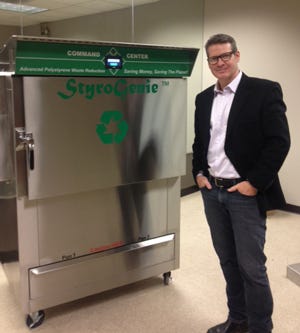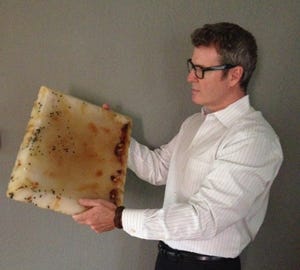Kerry Flickner was not a happy man when he read about the six largest U.S. school districts replacing EPS foam food trays with compostable paper plates.
June 1, 2015
Kerry Flickner was not a happy man when he read about the six largest U.S. school districts replacing EPS foam food trays with compostable paper plates. His biggest problem, he told PlasticsToday, is the lack of any commercial composting facility that can process the volume of paper plate waste feedstock these districts are expected to produce, which makes Flickner, National Director - Waste Solutions at Foodservice Sustainability Solutions (FSS; Marietta, GA), doubt that very few, if any, of these plates will actually be composted.
|
The StyroGenie converts EPS foam waste into blocks. |
"There are no commercial composters that can handle over 10 million pounds of paper plates (based on the weight of 2,250 million paper plates) these six districts will produce," he said. He's done the math, and New York City alone serves over 150 million meals on EPS foam trays, cups and bowls annually, so the 225 million trays per year the article cited is a bit low. Flickner noted that 25 EPS trays weigh one pound.
Flickner's interest goes beyond just making comments to the press regarding the myths and misunderstandings that surround EPS foam foodservice. His company is doing something about it. FSS specializes in waste stream reduction and recycling programs for so-called dirty EPS foam waste and the food waste produced in commercial and institutional foodservice operations.
"We seek to establish partnerships with school districts committed to sustainable practices as they relate to foodservice operations that contribute to a greener campus and community and [that] foster an academic learning environment for students today," said Flickner. "We believe it is our responsibility to invest in our future through informed and responsible waste disposal strategies, while also educating the future generation in critical thinking and in the importance of being good stewards and preserving our environment."
One way FSS is achieving this goal is through its equipment—a machine called the StyroGenie. One StyroGenie will process on site up to 3600 foam foodservice trays per day. Through a proprietary process, the StyroGenie reduces waste volume by 95%, creating two blocks that weigh 8 to 10 pounds each. The blocks are then set aside at the school until the company picks them up—typically once a month or bimonthly, depending on the size of the school—for delivery to the FSS processor for recycling or resource recovery, diverting 100% of waste from local landfills.
The blocks are broken down, flaked, washed, melted, filtered and pelletized for recycling into picture frames or other plastic products. "District initiatives that switch to paper-based products cannot realize any of these benefits, and from our studies, these initiatives do just two things: Appear environmentally sustainable while actually spending precious school funds," said Flickner.
|
Kerry Flickner holds a block made from EPS foam |
Recently, FSS helped the Houston Independent School District (HISD), the seventh largest in the United States with an operating budget of approximately $1.5 billion for its 300 schools. The HISD serves over 200,000 meals each day. As other school districts have done, the HISD decided to ban all polystyrene foam products from food service operations, switching to a compostable product.
Making this change cost the school district an additional $1 million from its student nutrition budget. Subsequently, the district discovered there was no commercial composter in the United States that could process over five million trays per month of this specific carbon feedstock. In response, the district then switched to a biodegradable product, which turned out to be too flimsy, thus requiring food-service to double-up trays for greater sturdiness. District leaders were misinformed and misled into believing that this product would biodegrade in a landfill, which is where this product ultimately ended up.
"We introduced the Houston ISD to a new method for dealing with EPS waste, which allowed the district to use a more cost-effective product as well as reduce and recycle all the EPS waste," said Flickner. "The implementation of a Foam Waste Reduction and Recycling Program has enabled the district to change from expensive compostable and biodegradable foodservice products back to EPS foam trays, thus saving about $1 million in their foodservice nutrition budget while realizing significant reductions in the district's waste stream and removal costs."
In just two months, Flickner claims that the implementation of this waste-reduction program into a six-school pilot program reduced the waste stream by 75% and reduced dumpster pick-ups by 48 days over just an eight-week period (representing one day's reduction per week for each of the six schools), while diverting 100% of all foodservice foam waste from landfill for recycling. The six schools' waste stream pre-implementation was about 100 garbage bags per day; implementing the program reduced waste to just 25 bags of garbage per day.
"Through this program, the school district has set an example by showing the community a responsible and informed way to deal with EPS waste," said Flickner. "This communicates commitment to children and their future. In turn, they will have the opportunity to learn from an early age the importance of critical thinking and acting as responsible stewards in their communities and the larger world."
About the Author(s)
You May Also Like






